BURMA'S president has acknowledged major destruction in the west of the country, scene of recent ethnic unrest, the BBC reports. Officials have said 64 people died this week, but Human Rights Watch says it fears the figure could be much higher.
PHUKET: With the media banned from reporting at first hand the Phase II ethnic cleansing of Rohingya Muslims now taking place in Burma (Myanmar), Human Rights Watch uses satellite technology to detail the scale of this week's deadly devastation.
THE GOVERNMENT of Burma should take immediate steps to stop sectarian violence against the Rohingya Muslim population in Arakan (Rakhine) State in western Burma and ensure protection and aid to both Rohingyas and Arakanese in the state, Human Rights Watch said today.
New satellite imagery obtained by Human Rights Watch shows extensive destruction of homes and other property in a predominantly Rohingya Muslim area of the coastal town of Kyauk Pyu - one of several areas of new violence and displacement.
Human Rights Watch identified 811 destroyed structures on the eastern coastal edge of Kyauk Pyu following arson attacks reportedly conducted on October 24, 2012, less than 24 hours before the satellite images were captured.
The area of destruction measures 35 acres and includes 633 buildings and 178 houseboats and floating barges adjacent on the water, all of which were razed.
There are no indications of fire damage to the immediate west and east of this zone of destruction.
Media accounts and local officials said that many Rohingya in the town fled by sea toward Sittwe, the capital of Arakan State, 200 kilometers to the north.
Violence renewed between Arakan Buddhists and Rohingya Muslims on October 21 and continued all week in at least five townships: Minbya, Mrak-U, Myebon, Rathedaung, and Kyauk Pyu.
This was the first time violence had reached Kyauk Pyu and most of these other parts of the state since the sectarian violence and related abuses by state security forces against the Rohingya began in early June.
The Rohingya have suffered the brunt of the violence.
''Burma's government urgently needs to provide security for the Rohingya in Arakan State, who are under vicious attack,'' said Phil Robertson, deputy Asia director at Human Rights Watch.
''Unless the authorities also start addressing the root causes of the violence, it is only likely to get worse.''
The Burmese government initially said that more than 2800 houses were burned down in the new violence and that 112 people were killed, an estimate they later reduced to 64.
Human Rights Watch fears the death toll is far higher based on allegations from witnesses fleeing scenes of carnage and the government's well-documented history of underestimating figures that might lead to criticism of the state.
In June, Human Rights Watch documented killings, rape, and mass arrests by Burmese security forces against Rohingya Muslims after the security forces failed to protect both them and Arakan Buddhists during deadly sectarian violence.
Since then, government restrictions on humanitarian access to the Rohingya community left many of the displaced - at times as many as 104,000 people - in dire need of food, shelter, and medical care.
Before this most recent outbreak of violence, the local Arakan Buddhist population had largely resumed life and daily activities as usual.
The approximately 75,000 internally displaced persons, most of them Rohingya, were still taking shelter in at least 40 displacement camps in Sittwe and Kyauktaw townships. The 15 largest camps surround Sittwe.
Sittwe's estimated population of 200,000 people had been divided evenly between Buddhists and Muslims.
Now the Rohingya and non-Rohingya Muslim population of Sittwe has been largely segregated to the displacement camps, and Sittwe is nearly devoid of Muslims.
The Burmese government denies citizenship to most Rohingya and the protections that come with it.
Since communal violence between Rohingya and Arakanese erupted in June, many Rohingya have been compelled to live in squalid camps in Arakan State, where they have been denied access to adequate humanitarian aid and vulnerable to attack from Arakan militants.
President Thein Sein appointed an investigative commission earlier in 2012 to determine the causes of violence, but has yet to propose any policies to address those causes.
He has at times called for the segregation of the Rohingya and even their expulsion from Burma, which feeds popular animosity against the Rohingya from the general population.
The opposition leader Aung San Suu Kyi has called for establishing the rule of law in the Arakan State, but has not used her moral authority to urge reconciliation or end discriminatory treatment of the Rohingya under Burma's nationality law.
The recent resurgence of violence and displacement of thousands more Rohingya will put added pressure on the humanitarian needs in the state, Human Rights Watch said.
Humanitarian agencies have had little to no access to remote rural areas where affected Rohingya are located, and some of the IDP camps need adequate shelter, water and sanitation, health, education, and other aid. Moreover, all United Nations and international agency pre-crisis humanitarian aid programs to the Rohingya population were suspended by the central government in June, Some - but not all - have been reauthorised.
Approximately one million Rohingya in Burma were effectively stripped of the right to citizenship with the passage of the 1982 Citizenship Law, though most have been residents of Arakan State for decades.
Both the Rohingya and Arakan communities have long experienced a litany of abuses by the Burmese authorities.
''Deploying sufficient security forces to restore order impartially and protect basic rights in Arakan State is necessary, but not enough,'' Robertson said.
''Burmese government officials and opposition leaders need to condemn the violence and work for lasting solutions to Arakan's ethnic problems.''

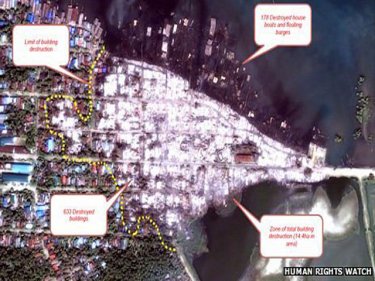
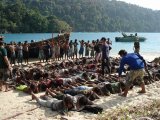
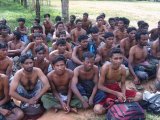

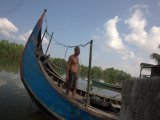

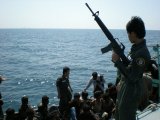

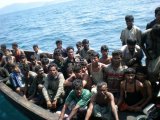


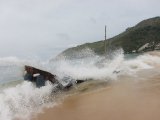




I dont want to google these folks, but could the so-called experts, please tell me why these people are hated so much? You cannot just go exterminate a whole race of people, the Germans tried it and that did not work, Serbia tried too, that did not work. So WHY are these people hated so much, especially by the Buddhists? Makes their faith pretty worthless in human rights terms. Where is the great protector of the Burmese people, " Soek j kak ne!", Aung San Suu Ky? Aung San Suu Kyi used the Nobel Peace Prize's 1.3 million USD prize money to establish a health and education trust for the Burmese people. The world should put FAIL next to her for not giving any aid to these unwanted people.
What a shame on Burma.
Posted by Robin on October 27, 2012 17:24